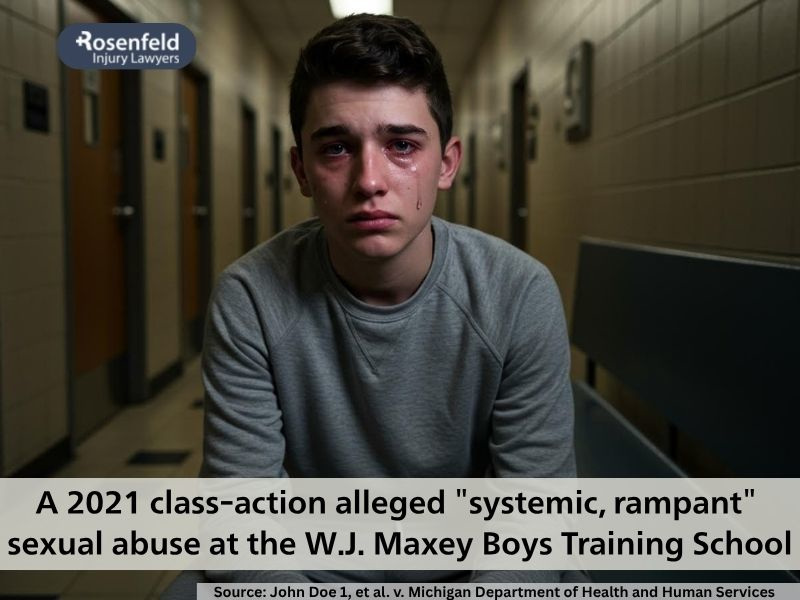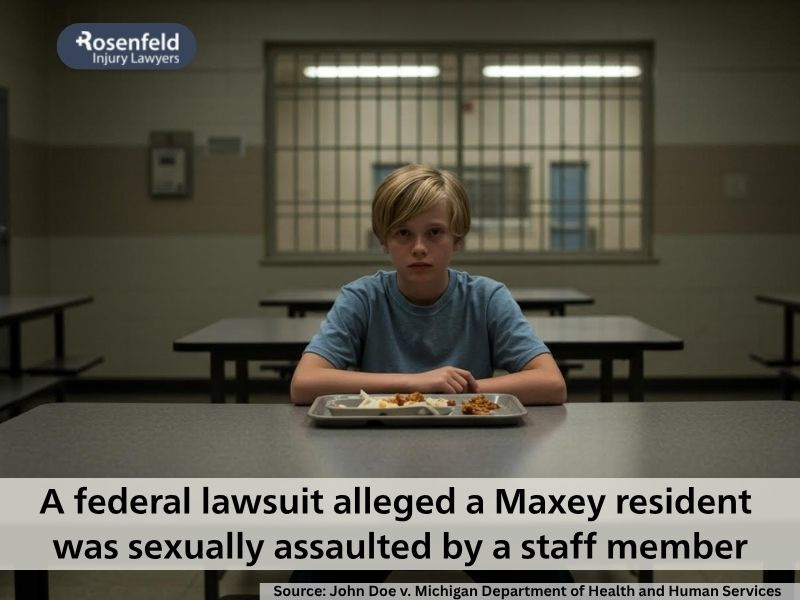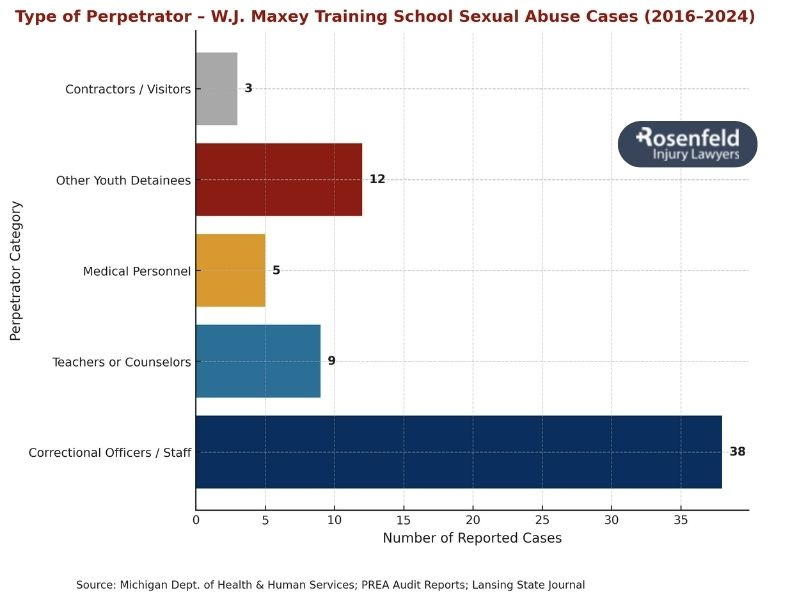W.J. Maxey Training School Sexual Abuse Lawsuits
Compensation for Victims of Sexual Assault at Maxey Boys Training School
At Injury Lawyer Team, we fight for survivors of institutional abuse who deserve justice and compensation. Reports of W.J. Maxey Training School sexual abuse reveal disturbing accounts of sexual harassment, physical violence, and negligence at this former Whitmore Lake juvenile facility.
Many former inmates allege repeated sex abuse by staff members, resulting in lasting emotional trauma, substance abuse struggles, and the need for ongoing medical and mental health care.
Our sex abuse lawyers represent survivors in Michigan youth detention sexual abuse lawsuits, helping them file civil lawsuits and pursue financial compensation for the trauma they endured. If you or someone you love was sexually abused at Maxey Training School, contact us today for a free case evaluation. We are here to help survivors seek justice.

W.J. Maxey Training School Sexual Abuse Allegations
About the Facility
The W.J. Maxey Boys Training School, often referred to simply as Maxey Training School, was once the largest youth detention facility in Michigan. Located in Whitmore Lake, it housed hundreds of boys between the ages of 12 and 21 who were placed there by juvenile courts across the state.
Officially, the school’s mission was to provide structure, education, and rehabilitation. In reality, former residents describe an environment marked by violence, neglect, and repeated sex abuse.
Survivors have reported that staff members routinely failed to protect juveniles from physical fights, sexual acts coerced by older inmates, and, in some cases, direct sexual abuse by employees themselves.
Instead of receiving rehabilitation, boys often endured unsafe conditions, inadequate treatment, and emotional trauma that followed them into adulthood. The facility’s reputation as a training school was overshadowed by its role as a place where negligence allowed abuse to persist unchecked.
U.S. Department of Justice Report
Concerns about the facility eventually drew federal scrutiny. In 2003, the U.S. Department of Justice (DOJ) conducted an investigation into conditions at Maxey Training School. The DOJ report documented serious constitutional violations, including failures to protect juveniles from sexual abuse, inadequate mental health support, and excessive reliance on physical force.
The findings highlighted how deliberate indifference by administrators exposed vulnerable youth to ongoing harm. The report further noted that staff failed to provide proper treatment, leaving many juveniles to cope with injuries, emotional distress, and trauma without appropriate support.
Closure
Amid mounting criticism and declining population numbers, the facility was permanently closed in 2015.
Many survivors continue to grapple with the consequences of what they endured—emotional trauma, substance abuse, and the long-term need for mental health support. For these individuals, civil lawsuits remain a critical pathway to seek justice and hold the State of Michigan accountable for years of systemic abuse.
What Laws Govern Sexual Abuse Claims Against W.J. Maxey Training School?
Survivors of sexual abuse have several legal pathways to pursue accountability. These cases often involve both Michigan state and federal constitutional protections, reflecting the complex process survivors must navigate when seeking justice.
Michigan Criminal Sexual Conduct Laws
Under MCL § 750.520b – 750.520e, Michigan law defines the degrees of criminal sexual conduct. This outlines how sex abuse is prosecuted, ranging from first-degree sexual conduct (the most serious) to fourth-degree offenses. Survivors of sexual abuse at juvenile facilities may see their abusers charged under these laws, which recognize sexual acts committed through force, coercion, or abuse of authority.
Eighth Amendment to the U.S. Constitution
The Eighth Amendment prohibits cruel and unusual punishment. In custodial settings such as juvenile detention, courts have interpreted this amendment to protect juveniles from sexual abuse by staff or other inmates. When administrators or staff show deliberate indifference to the risk of abuse, it may rise to a constitutional violation.
Fourteenth Amendment – Due Process Clause
The Fourteenth Amendment protects the liberty interests of individuals in state custody. For survivors of abuse at Maxey Training School, this clause provides a constitutional basis for civil lawsuits against the state when systemic failures expose juveniles to repeated sex abuse, emotional suffering, and denial of proper treatment.
42 U.S.C. § 1983 (Section 1983 Civil Rights Act)
Section 1983 allows survivors to sue state officials or agencies in federal court for constitutional violations, including sex abuse. This act has been central in sexual abuse lawsuits against correctional and youth detention facilities, enabling survivors to hold both individual staff members and institutions accountable.
Prison Rape Elimination Act (PREA) of 2003
The Prison Rape Elimination Act (34 U.S.C. § 30301 et seq.) was designed to prevent, detect, and respond to sexual abuse in confinement facilities, including juvenile justice institutions. PREA mandates national standards and facility-level protocols, but does not create a private right to sue.
However, violations of PREA standards often strengthen youth detention sex abuse lawsuits by highlighting failures in prevention and oversight.
Michigan Governmental Tort Liability Act (MCL § 691.1407)
Section 691.1407 grants qualified immunity to government employees and agencies in Michigan. However, it does not shield staff members who commit intentional misconduct or gross negligence, such as sexual abuse. For survivors of abuse at Maxey Training School, this law helps determine when the state itself—or its employees—may be held liable in civil court.

How Long Do Victims Have to File Civil Lawsuits in Michigan?
For boys abused at Maxey, understanding the sexual abuse statute of limitations is critical. Michigan law provides specific timelines for when survivors can file lawsuits and pursue accountability in court. These deadlines are meant to balance fairness in the legal process, but often create other forms of obstacles for survivors who may need years to process trauma and come forward.
MCL § 600.5805(6) – 10-Year Statute of Limitations
Under MCL § 600.5805(6), survivors have 10 years from the date of the abuse to file a lawsuit based on criminal sexual conduct, even if the perpetrator was never criminally convicted.
MCL § 600.5851b – Discovery Rule
Recognizing that many survivors of sexual abuse cannot immediately process or disclose what happened to them, Michigan also provides a discovery rule under MCL § 600.5851b.
This law allows survivors to file claims until their 28th birthday, or within three years of discovering the connection between the abuse and resulting emotional repercussions, or need for health care, whichever date is later.
Pending Legislation – Justice for Survivors Act
In May 2025, the Michigan Senate passed the Justice for Survivors Act (SB 257–SB 261), a comprehensive reform package designed to extend access to justice for sexual abuse survivors.
If enacted, this legislation would broaden the window for survivors to bring claims, remove some procedural barriers, and ensure that institutions can be held accountable when negligence enables abuse.
Who Can Be Held Liable in Lawsuits for Sex Abuse at W.J. Maxey Training School?
Survivors may bring lawsuits against multiple parties. Liability often extends beyond the individual abuser to those who allowed misconduct to continue.
- Staff Members – Employees who committed sex abuse or failed to protect juveniles from repeated sex abuse can be held personally responsible.
- Supervisors & Administrators – Leaders who ignored complaints or failed to supervise staff may be liable for institutional negligence.
- Michigan Department of Health and Human Services – As the agency overseeing the center, the department may face claims for unsafe conditions, denial of treatment, and failure to provide adequate care.
- State of Michigan – While generally shielded by immunity laws, the state may be liable when gross negligence or constitutional violations occur.
- Contractors/Providers – Outside agencies handling security or health services may share responsibility if their failures enabled abuse.
What Damages Can Sex Abuse Survivors Recover?
Maxey survivors may be entitled to significant financial compensation through youth detention sexual abuse lawsuits. The harm caused by sex abuse, negligence, and lack of protection in custody is profound, often leaving lifelong scars. Civil lawsuits allow survivors to pursue both financial and non-financial damages.
Economic Damages
These cover measurable financial losses such as:
- Costs of medical treatment and hospitalization.
- Mental health support and long-term therapy expenses.
- Lost income or reduced earning capacity caused by trauma-related difficulties.
Non-Economic Damages
These address the personal suffering survivors endure, including:
- Emotional harm and distress.
- Ongoing trauma, anxiety, depression, or PTSD.
- Loss of quality of life and damage to relationships.
Punitive Damages
In cases of repeated assaults or deliberate misconduct, courts may award punitive damages designed to punish offenders and negligent institutions in order to deter future abuse.

Sexual Assault Settlements & Verdicts Recovered by Our Law Firm
Our team of experienced Michigan sexual abuse lawyers has helped survivors secure meaningful financial compensation. Every case is unique, and settlement values often depend on several factors.
Below are examples of recoveries our firm’s sex abuse lawyers have achieved for clients:
- $21,000,000 Settlement – A teenage boy was repeatedly assaulted by a staff member at a hotel after prior complaints against the abuser were ignored. The large recovery reflected both the severity of the abuse and the state’s failure to act on warning signs.
- $15,000,000 Settlement – Several boys filed suit against a private athletic program after being groomed and assaulted by a longtime coach. The case value was influenced by evidence that administrators knew of prior misconduct but failed to remove him from contact with students.
- $5,000,000 Settlement – Two male patients came forward against a therapist who used his position of trust to exploit them. The case highlighted the devastating impact of abuse by a mental health professional and the need for years of ongoing counseling.
How Injury Lawyer Team Can Help
Taking legal action after Maxey Training School sexual abuse can be overwhelming. Victims face complex laws, state immunity defenses, and the emotional challenge of revisiting trauma.
Our experienced sexual abuse attorney knows how to build strong cases against staff, administrators, and the State of Michigan. We gather evidence, work with experts, and fight for full accountability.
We handle cases on a contingency fee basis, and you pay nothing unless we win. If you or a loved one was sexually abused at Maxey, contact Injury Lawyer Team sex abuse lawyers today for a free case evaluation. We are here to help you navigate the lawsuit and find justice.
All content undergoes thorough legal review by experienced attorneys, including Jonathan Rosenfeld. With 25 years of experience in personal injury law and over 100 years of combined legal expertise within our team, we ensure that every article is legally accurate, compliant, and reflects current legal standards.








